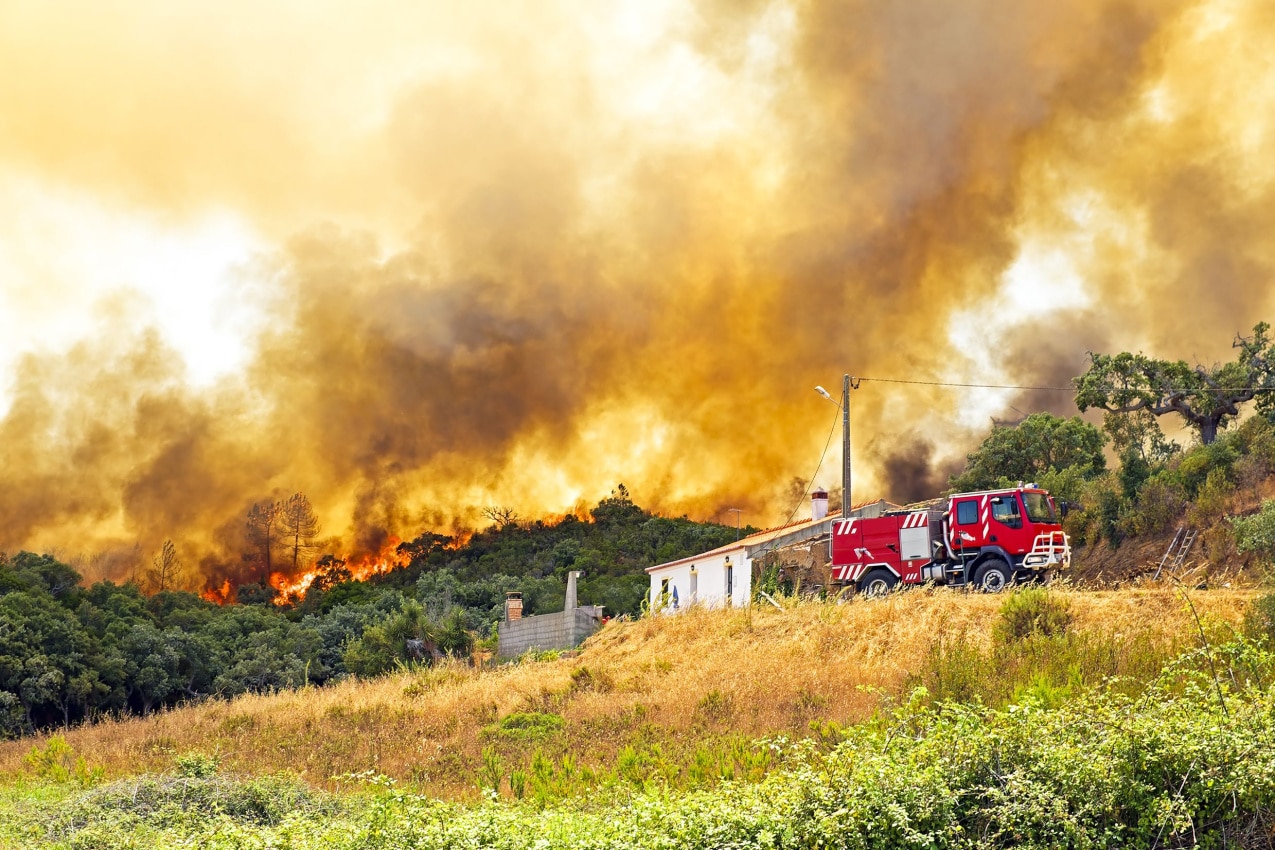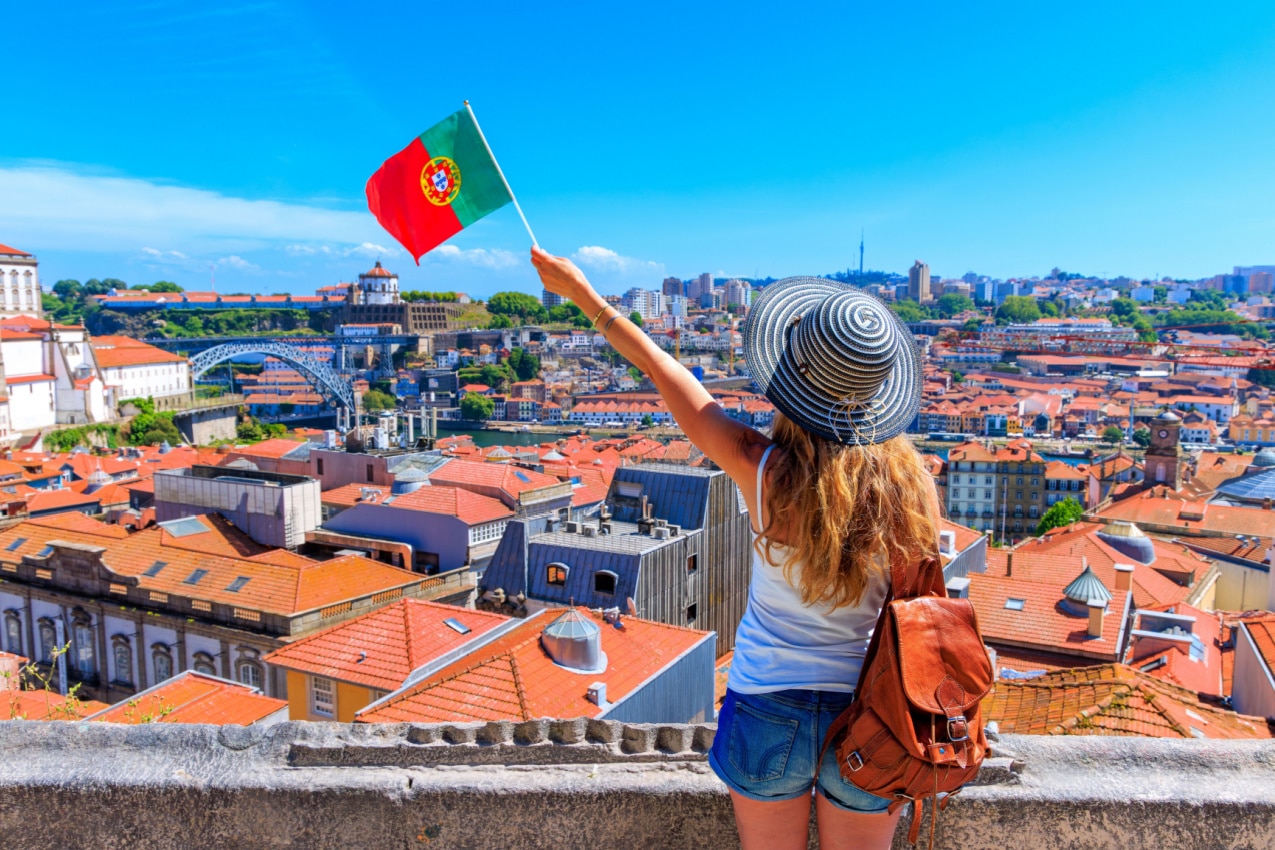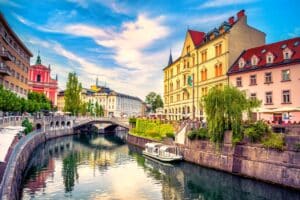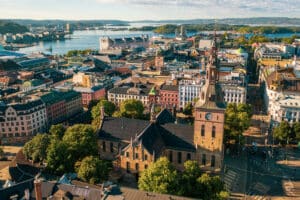Let’s get one thing clear straight away: Portugal is safe! But it’s not only safe – it’s also rich in beauty and history. Portugal traces its roots back to 1143 C.E., making it the oldest nation-state in Europe.
In 2023, European Best Destinations named two Portuguese destinations, Porto Santo on Madeira Island and Faial Island in the Azores, among the 20 trendiest in Europe. Beyond these hotspots, Portugal beckons with more allure: Douro Valley in Continental Portugal, hilly coastal charm in nearby Porto, 16th-century gems like Belém Tower and the Gothic Jerónimos Monastery in Lisbon, and awe-inspiring natural wonders that you can’t find anywhere else.
Back to the matter of safety, Portugal is actually among the safest countries globally, provided you follow a few common-sense guidelines. Let’s learn more!
Are you planning a last minute trip to Portugal? We’ve put together all the resources you’ll need for a fun & safe travel:
🛌 Best & Safest Places to Stay in Portugal:
👉 Tivoli Carvoeiro – Pets allowed, Sea view, Spa and wellness centre
👉 GA Palace Hotel – 2 swimming pools, Airport shuttle, Family rooms
👉 Octant Douro – 3 swimming pools, 2 restaurants, Fitness centre
👉 Monchique Resort – Spa and wellness centre, Free WiFi, Fitness centre
⛱️ Fun Activities & Tours in Portugal:
👉 Lisbon City Center Tour – The Unmissable Lisbon
👉 Complete Douro Valley Wine Tour with Lunch, Wine Tastings
👉 2 Hour Lisbon Sunset and Wine Sailing Tour
🚗 Best & Safest Portugal Transportation Services:
👉 Airport Pickup Service – Welcome Pickups
👉 Rent a Car – DiscoverCars
🙏 Stay Safe While Travelling:
👉 Safetywing (for medical insurance)
👉 VisitorsCoverage (for trip insurance)
Is Portugal Safe?

Yes, Portugal is known to be very safe. In the 2023 Global Peace Index, Portugal secured the seventh spot, standing shoulder to shoulder with Iceland, New Zealand, Ireland, Denmark, Austria, and Singapore, and outshining countries like Switzerland, the Netherlands, and Japan.
Here’s the lowdown on safety:
- International travel advisories: Level One, practice normal precautions
- Crime rating: Very low, at 31.09
- Most common crimes: Theft, drunk driving, scams, and assault
- High-crime areas: Sintra and Queluz, Costa da Caparica beaches, Guincho beach, Cascais, Cabo da Roca, and Boca do Inferno in Lisbon
- Public transportation safety: Keep an eye on your belongings on tram routes E28 to Castelo de São Jorge, E25 to Prazeres, and E15 to Belém in Lisbon
- Safety walking alone during the day: Very safe
- Safety walking alone during the night: Safe
- Road safety: Roads are well-maintained and safe, be cautious of wild animals crossing the street in rural areas and fast drivers on highways
- Beach safety: 394 beaches marked by the Blue Flag for quality and safety
- Tap water: Safe to drink
- Common natural disasters: Forest fires, earthquakes, floods, and landslides
- Carbon monoxide poisoning: The threat is possible, but carbon monoxide detectors are there to protect you
- Police presence: ~50,000 police officers
- Medical care quality: Globally ranked 9th in quality
Travel Advisory for Portugal
The travel advisories of the United States, United Kingdom, Ireland, Canada, Australia, and New Zealand all place Portugal under Level One, recommending tourists to exercise normal precautions.
For crime, the advisories provide a heads-up on issues like bag snatching, pickpocketing, and theft from cars.
For higher-risk zones, authorities advise increased caution around Sintra and Queluz, Costa da Caparica beaches, Guincho beach, Cascais, Cabo da Roca, and Boca do Inferno in Lisbon, tram routes E28 to Castelo de São Jorge, E25 to Prazeres, and E15 to Belém, also in Lisbon, and walking alone after dark along the Douro River Waterfront in Porto.
Following recent terrorist attacks in Europe and the Middle East, the travel advisories note a heightened terrorism warning, informing tourists to expect increased presence of security forces in public places and near government buildings.
On the natural front, international travel advisories highlight ongoing wildfires in Portugal, including near popular tourist destinations in the Algarve region.
A Comprehensive Look at Portugal Crime Rates
Portugal has a very low crime rating of 31.09.
The Annual Crime Report of 2022 reveals a total of 343,845 registered crime reports in Portugal—mainly revolving around property crimes like theft, drunk driving, scams, and assaults.
Portugal upholds an impressively low homicide rate. In 2020, the country reported a homicide rate of 0.80 incidents per 100,000 people. To put this in perspective, the U.S. homicide rate for 2021 stood significantly higher at 6.81 per 100,000 people.
The 2023 Barometer on the perception of crime and insecurity in Portugal paints a reassuring picture—nearly 90% of the population feels safe in their residential areas.
| Safety Concerns | Crime Rate | Status |
| Overall Crime Level | 27.36 | Low |
| Increase in Crime (Past 3 Years) | 52.79 | Moderate |
| Home Break-Ins and Thefts | 26.14 | Low |
| Mugging and Robbery | 31.74 | Low |
| Car Theft | 26.40 | Low |
| Theft from Vehicles | 36.54 | Low |
| Personal Attacks | 26 | Low |
| Verbal Insults | 25.26 | Low |
| Racial, Ethnic, Gender, or Religious-Based Attacks | 15.78 | Very Low |
| Drug Use and Dealing | 41.13 | Moderate |
| Property Crimes (Vandalism and Theft) | 37.03 | Low |
| Violent Crimes (Assault and Armed Robbery) | 25.52 | Low |
| Corruption and Bribery | 47.74 | Moderate |
| Safety Walking Alone in Daylight | 83.49 | Very High |
| Safety Walking Alone at Nighttime | 62.12 | High |
Police Presence in Portugal
The Portuguese police force consists of approximately 50,000 individuals. You’ll frequently find them maintaining public order in cities, overseeing everything from criminal incidents to assisting those in need.
Should you require directions or protection, or have general questions about Portugal, feel free to approach the police; they are there to assist you. If the police engage with you for any reason, it’s advisable to be courteous and polite, and ensure you have your identification documents, as they may request to see them.
Most recently, in November 2023, the Lisbon Metropolitan Command (Cometlis) of the Public Security Police (PSP) took proactive steps to bolster safety. They’ve rolled out a prevention and visibility plan to increase police presence in high-risk areas. To add an extra layer of accessibility, “citizen police stations” are in the works, with the first one anticipated to open in Rato, Lisbon.
Public Transportation Safety in Portugal

Public transportation in Portugal is generally safe for travel, but just to be sure, remain vigilant and mindful of your belongings to dodge potential pickpockets.
The train system doesn’t cover the entire country but nevertheless, it efficiently connects major cities like Lisbon, Porto, Aveiro, Coimbra, Faro, and Lagos. Train tickets and timetables can be accessed at cp.pt.
Long-distance buses (coaches) are faster and more direct than trains. Operators like Rede Expressos, Rodo-Norte, and Eva Transportes offer modern, comfortable rides with amenities like Wi-Fi. Local buses don’t require advance booking—you can check timetables at the bus stop and purchase tickets onboard or at nearby kiosks.
Lisbon and Porto are the only cities in Portugal with metro systems, known for their cleanliness, safety, and efficiency. Metro services run from 06:00 to 01:00 (6 am to 1 am), and you can access maps of the Lisbon Metro to pre-plan your trip.
Trams in Lisbon and Porto, though old, are well-maintained. Route details can be checked on carris.pt. Exercise caution on tram routes E28 to Castelo de São Jorge, E25 to Prazeres, and E15 to Belém in Lisbon, as per international travel advisories.
Taxis are considered safe and reliable. Respected and recommended companies include Retalis or Cooptaxis. You can estimate trip costs using TaxiFareFinder. Ride-sharing services like Uber, Cabify, Bolt, BlaBlaCar, and Boleia are available, but some drivers have been found operating without licenses.
Road Safety in Portugal
Roads in Portugal are well-maintained and safe. First-time drivers in Portugal should note that traffic in bigger cities can be heavy during peak hours, and navigating narrow streets in older towns may require some skill. On highways some drivers may drive very fast, so staying alert is crucial. Rural areas may have poorly-lit roads and oftentimes, animals cross the road. Use GPS navigation and drive with caution.
Medical Care Quality in Portugal
Portugal’s healthcare system ranked 9th in quality on the 2023 World Index of Healthcare Innovation. Notably, Portugal excelled in patient-centered care, ranking 13th, surpassing its neighbor, Spain, which was 19th. Additionally, Portugal’s medical infrastructure secured an impressive 3rd place globally.
Some notable hospitals contributing to this esteemed ranking include:
- Centro Hospitalar Universitário de Lisboa Central, Lisbon
- Centro Hospitalar e Universitário de Coimbra, Coimbra
- Centro Hospitalar Universitário do Porto, Porto
- IPOLisboa, Lisbon
- Clínica do Bonfim, Porto
- Entre Douro e Vouga Hospital Center, Santa Maria da Feira
- Santa Cruz do Bispo Central Hospital, Santa Cruz do Bispo
- Centro Hospitalar de Setúbal, Setúbal
Opting for travel insurance in case of unexpected events during your journey will cover a great deal of your medical expenses. Excellent travel insurance options include April, Allianz, AXA Assistance USA, GlobeHopper Senior Plan, and Europ Assistance.
Is It Safe to Travel Solo in Portugal?
As the seventh safest country globally, Portugal is an excellent destination for solo travelers. Walking alone here shouldn’t pose a significant threat, given its high “safety walking alone during the day/night” records on Numbeo.
However, you shouldn’t overlook the advice from the international travel advisories and be cautious around certain areas in Lisbon and Porto. Stick to populated places with good lighting.
While enjoying the sights, be vigilant against pickpockets in tourist areas and public transport, as you would in any major city. Plan your nighttime transportation in advance, whether by booking a reliable taxi service or using reputable ride-sharing apps. English is widely spoken, but learning basic Portuguese will help you blend in with the locals.
Perils of Nature: The Risk of Natural Disasters in Portugal

Portugal is susceptible to several natural disasters, including forest fires, earthquakes, floods, and landslides.
Forest Fires
Wildfires pose a risk during the hot and dry summer months. These fires spread swiftly, affecting both rural and urban areas.
A recent wildfire in August 2023, fueled by temperatures exceeding 40°C (104°F) across much of the Iberian Peninsula, led to evacuations in 19 villages, tourist accommodations, and a camping site near Odemira.
Typically, wildfires occur in the country’s outskirts, far from urban centers. Plus, they only happen during summer, the hottest time of the year. So, unless you are staying in rural areas or camping in nature, you are generally not in immediate danger.
Earthquakes
Portugal resides in a seismically active region, although significant earthquakes are infrequent.
The Lisbon earthquake of 1755 stands out as the most intense earthquake in Portuguese history. Occurring on Saturday, November 1st, seismologists now estimate its magnitude to be around 8.5 on the Richter scale. This powerful earthquake nearly devastated Lisbon and surrounding areas, claiming over a third of the city’s population.
Since then, Portugal has not experienced an earthquake of comparable magnitude. The most recent earthquake occurred on January 5, 2024. It had a 2.6 magnitude on the Richter Scale and is considered too small to be felt.
While the likelihood of experiencing a significant earthquake during your vacation in Portugal is rare, it’s essential to stay informed about earthquake information. Familiarize yourself with the “Drop, Cover, and Hold On” safety protocol:
- Drop to the ground to avoid being knocked over by the shaking.
- Take cover under a sturdy piece of furniture, such as a table or desk.
- Hold onto your shelter until the shaking stops.
Floods
Autumn and winter usher in heavy rain in Portugal, posing a risk of flooding.
Notable instances include the 2015 floods in the Algarve, resulting in one fatality, and the more substantial 2010 floods in Madeira, causing mudslides and claiming 42 lives.
The most recent flooding hit Lisbon in December 2023, triggering emergency responses to 158 incidents, including floods and landslides. Roads and tunnels in the city were closed, prompting a red alert from the Lisbon city government, advising residents to stay home and avoid commuting.
For your safety, it’s crucial to follow authorities’ instructions during floods. Stay updated on weather forecasts, avoid driving in flooded areas, and remain indoors until the situation is resolved.
Landslides
The hilly and mountainous terrain in Portugal is prone to landslides, particularly during the heavy rainfall that characterizes the fall and winter months.
On September 12, 2022, floodwater, mud, downed trees, and debris raced down hillsides near the village of Sameiro. A few weeks later, on September 24, 2022, authorities in the municipality of Esposende reported two fatalities due to a landslide following heavy rainfall.
As already mentioned, early December 13, 2023, saw emergency teams dispatched to 158 incidents across the Lisbon district—some of them due to landslides. The worst-affected municipalities were Cascais, Oeiras, Loures, Odivelas, Sintra, Amadora, and the city of Lisbon.
Landslides occur in areas with a history of such incidents. So don’t book your stay in areas with landslide history and, more importantly, don’t hike or drive in landslide-prone areas during or after heavy downpours.
Beware the Silent Threat: Carbon Monoxide Poisoning in Portugal
In Portugal, carbon monoxide poisoning is uncommon but there have been cases that led to hospitalization. The latest incident occurred on December 23, 2023, in Sintra, where fifteen people were hospitalized due to carbon monoxide exposure at a residence in Tapada das Mercês.
For those unfamiliar, carbon monoxide (CO) is an invisible gas resulting from the improper burning of fossil fuels like gas, diesel, and wood. Inhaling it can cause nausea, dizziness, or even loss of consciousness. Prolonged exposure may lead to severe issues such as paralysis, brain damage, or, in extreme cases, loss of life.
The key to protection against this silent threat is a device known as a carbon monoxide detector. Functioning similarly to a smoke detector, it sounds an alarm upon detecting dangerous carbon monoxide levels.
Many accommodations worldwide, including hotels and rentals, typically have CO detectors in place. So, upon landing in Portugal, your hotel room should be equipped with such a device. For added assurance, have a quick chat with the hotel staff before booking, or bring a portable carbon monoxide detector for extra safety.
Serenity by the Shore: The Safety of Portugal’s Beaches
Portugal has 394 beaches adorned with the Blue Flag—so rest assured you’ll be swimming on beaches with some of the best water quality in the world, top-notch environmental management, and commitment to safety.
Portugal’s beaches display a set of colored flags, each conveying vital information about the safety conditions of the waters:
- Green Flag – Calm waters, safe for swimming
- Yellow Flag – Strong sea current, swimming not recommended
- Red Flag – Dangerous and life-threatening water conditions, no swimming allowed
- Chequered Flag – Temporary lack of lifeguard
- Yellow and Red Paired Flags – Lifeguard-patrolled, considered safest for swimming
- Purple Flag – Presence of dangerous marine life like jellyfish, stingrays, sea snakes, or sharks
Memorize these flags and adhere to them at Portuguese beaches. Note that after September, the swimming season closes, with no lifeguards on duty and no safety flags displayed. If you want to swim or surf, it’s best to consult the locals about the conditions of the water.
If caught in a rip current, attract attention by waving and calling for help. Stay calm, float, and go with the flow until the rip weakens. Then, swim parallel to the shore away from the rip, aiming for breaking waves.
Portugal Weather Patterns: What to Expect
Wondering about the weather in Portugal? Well, it depends on where you’re headed.
Up north, you can enjoy a subtropical vacation. Winters are mild and summers are warm. In the central and southern parts, it’s a Mediterranean paradise. Winters stay mild, but summers can get pretty hot. If you’re near the border with Spain, it’s a bit more continental. Summers are hot, and winters get colder.
Don’t forget your umbrella in the north—it’s rainier. As you head south, it gets drier. Braga gets a yearly average rain of 57 inches (1,450 mm), Porto gets 45 inches (1,100 mm), Coimbra around 35 inches (900 mm), Lisbon – 31.5 inches (800 mm), and Algarve – 20 inches (500 mm).
The Weather in Lisbon
Since Portugal has a range of climates, let’s zoom in on what the weather is like in the capital, Lisbon.
In the summer (from mid-June to the end of September), Lisbon is warm, dry, and mostly clear. The average high temperature is above 78°F (25.5°C). August is the hottest month, with an average high of 83°F (28.3°C).
In fall, winter, and early spring—or, the cool season (from mid-November to March), it’s a bit chilly. The average high temperature is below 63°F (17.2°C). January is the coldest month, with an average low of 47°F (8.3°C).
If you love clear skies, you’d enjoy visiting from June to mid-September. July is the clearest month, with a clear sky about 90% of the time. On the flip side, December is the cloudiest, with the sky overcast 49% of the time.
Rain falls from September to June, with November being the rainiest month, averaging 3.1 inches (78.74mm). The months from June to September are rainless, with July being the driest month, only getting around 0.1 inches (2.54mm) of rain.
The wind picks up from October to mid-August. December is the windiest month. But things calm down from mid-August to the end of October. September is the calmest month when it comes to wind.
For beach activities, the water temperature is at its warmest from the end of June to the end of October. August has the warmest waters around 66°F (18.8°C). January to the end of April boasts cooler waters, with February having the coolest water at 58°F (14.4°C).
Monthly Average Temperatures in Lisbon
| Month | Fahrenheit (°F) | Celsius (°C) |
| January | 52 | 11.1 |
| February | 54 | 12.2 |
| March | 57 | 13.8 |
| April | 60 | 15.5 |
| May | 64 | 17.7 |
| June | 69 | 20.5 |
| July | 72 | 22.2 |
| August | 73 | 22.7 |
| September | 71 | 21.6 |
| October | 65 | 18.3 |
| November | 58 | 14.4 |
| December | 54 | 12.2 |
When Is the Best Time to Visit Portugal?

For the perfect blend of great weather, manageable crowds, and reasonable prices, plan your visit to Portugal during the shoulder seasons – either from May to June or September to October.
Nevertheless, Portugal has something going on all year round, and each season has its perks:
- Summer has perfect weather, from mid-June to mid-September. This stretch boasts the sunniest weather, longest days, and warmest waters.
- June is chock-full of festivals. The summer month of June hosts the Festas dos Santos Populares (Feast Days of the Popular Saints) with vibrant celebrations on June 12, 23, and 29. The streets are transformed thanks to lively gatherings, delectable food, music, and jubilant festivities.
- Portugal embraces tranquility from winter to mid-spring. The coastal temperatures may dip, but the off-season offers a splendid opportunity to explore cities and attractions without the rush of tourists.
- Economical options abound in winter, spring, and fall. Affordable prices await during both shoulder and off-peak seasons. Spring and fall present reasonably priced options with better weather. Winter offers the lowest prices, albeit at the cost of colder temperatures.
How to Stay Safe in Portugal
- Be Mindful of Valuables
Pay attention to your surroundings, avoid displaying expensive items like watches and jewelry, and don’t carry large sums of cash. Consider leaving unnecessary belongings in a hotel safe and only carry essentials for the day.
- Vehicle Safety
Vehicle break-ins are common, so if you rent a car, avoid leaving valuables visible. Use secure parking facilities and refrain from offering rides to hitchhikers.
- Coastal Caution
In fall and winter, exercise caution when walking on beaches near the water’s edge, as waves can be unpredictable. Avoid beaches during severe weather warnings and watch for signs indicating cliff erosion and falling rocks. Don’t dive in unknown waters.
- Food Delivery Options
If you prefer ordering food, services like Comer em Casa or Glovo offer convenient food delivery options, especially if going out is not feasible.
- Learn Basic Portuguese
Learning some basic Portuguese can enhance your experience. Apps like Babbel and Duolingo are helpful tools for language learning.
- Purchase a Portuguese SIM Card
For an extended stay, consider getting a Portuguese SIM card for better service, calls, and personal internet without relying solely on public or hotel Wi-Fi. Popular providers include MEO, NOS, and Vodafone.
- Tap Water Safety
Tap water in Portugal is safe to drink throughout all regions, meeting EU standards. Though you can get bottled water, why use plastic when you don’t have to?
Emergency Numbers
- Police: 112
- Fire Brigade: 112
- Medical Emergency: 112
- Health Line: 808 24 24 24
Enjoy Portugal, But Don’t Forget to Pack Your Common Sense
In a nutshell, keep your common sense handy, and you’ll have a blast in Portugal!
Just be aware of pickpockets and scams. Stay away from the dangerous areas we mentioned above, especially at night. Natural disasters are pretty rare, though there might be a few tremors now and then. In the summer, you might encounter forest fires, so be cautious when you’re out hiking. If you’re hitting the beaches, pay attention to the flags. Only swim where the flag is green or yellow and red—these color combinations mean it’s safe to swim!
Now that we got all that out of the way, we wish you a wonderful trip to Portugal.




I am infuriated by the lack of acknowledgment for Pastéis de Nata in this guide! How come this dangerously delicious custard tart was not mentioned? 😀
– Thanks for an informative guide!